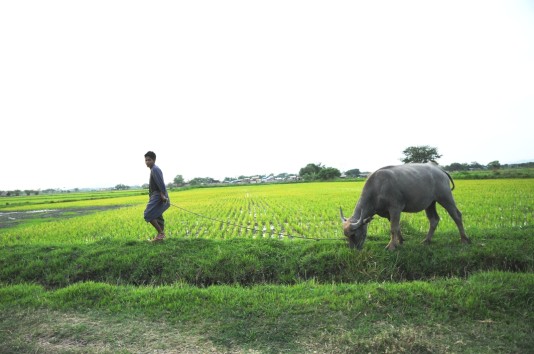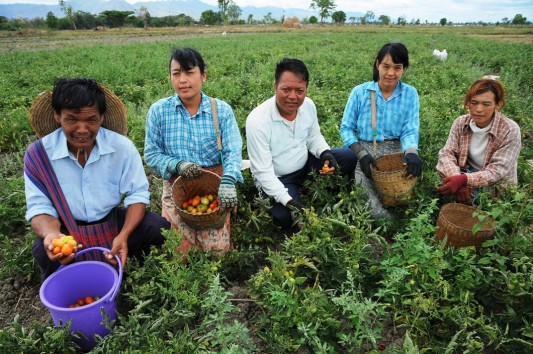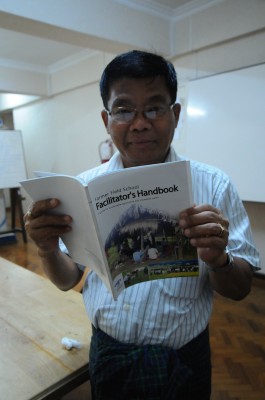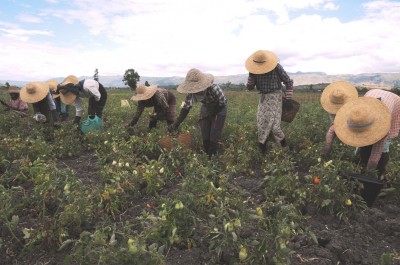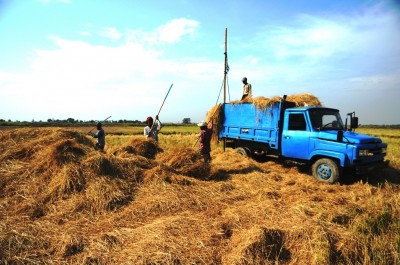Written by Yu-Jong Peng/Photoed by Yu-Jong Peng
To better understand the agricultural conditions in Myanmar, News & Market interviewed Dr. Ohmar Khaing,Chief Coordinator of the Myanmar Food Security Working Group (FSWG), an organization devoted to integrating NGOs and minority groups.
Facilitating integration among independent groups
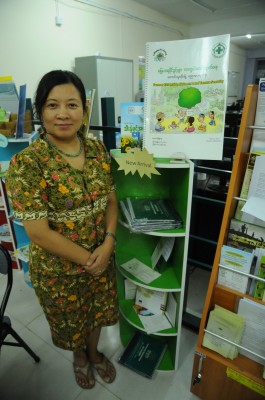
多年來串聯與協調緬甸各農業與環境NGO、少數民族草根組織的緬甸食物安全工作組織(Myanmar Food Security Working Group, FSWG) 統籌主任奧瑪博士(Dr. Ohmar Khaing) 及新出版的土地使用權工作手冊
Many agriculture-related organizations and minority groups in Myanmar work independently, and they need thesupport of a professional think tank, which is where the FSWG comes in, Dr. Ohmar explained.
The FSWG currently consists of 140 NGO and community members in and out of the country, and it also accepts individual members such as retired officials, freelancers, consultants and students.
The FSWG, however, didn’t start out as an organization devoted to facilitating integration. Like many agriculture-related and community-based NGOs, it began by launching its own projects.
The FSWG was established in 2003 with funding from The Rockefeller Foundation and the United Nations Development Programme (UNDP). In the early stages, the FSWG’s main objective was to study community-
based forestry and to promote the Farmer Field School (FFS). For the former task, the FSWG provided resources for members to engage in forestry. Projects included studying groups that utilize community-based
forest resources, enhancing understanding of these resources, and encouraging farmers to actively participate in preservation instead of passively relying on government authorities.
The FFS program was aimed at assisting members to establish sustainable agriculture by training leaders, increasing their knowledge on what techniques are available, how to launch projects, how to adapt to the different needs of ethnic groups as well as communities, and most importantly, encouraging farmer-led research.
The FSWG achieved its objectives before its funding was discontinued, but staffers and members came to realize the value of their organization as a node that facilitates multilateral exchange and information sharing among dozens of NGOs, and in the process of pursuing its objectives, the FSWG had accumulated numerous reports and field studies. After realizing this, the FSWG decided to continue promoting NGO networking and establish a Resources Center.
This led to a support system and a pool of resources that a lot of NGOs across Myanmar needed, and a lot of them were willing to pay for membership in exchange for access to these resources. The numerous reports and field studies that the FSWG had produced became a source of re-vitalization, paving the way to continued funding. By the end of 2013, the FSWG had published 27 IEC materials, covering subjects such as how to raise livestock, grow crops and vegetables more effectively to lift farmers out of poverty. These standardized materials were then handed out to government officials and researchers for them to revise and train farmers with.
In 2009, the FSWG launched an afforestation program for drought-affected areas across Myanmar with the UNDP and the Food and Agriculture Organization of the United Nations (FAO), providing training models for FSWG members to utilize. Organizations that took part in the program included ones from Chin State and Kachin State in the north, Rakhine State in the west, as well as Taninthayi State, Mon State and Kayin State in the relatively remote southeastern region. The program allowed minority groups from drought-affected areas to collaborate with one another, and in spite of transportation and communication limitations, the FSWG was able to maintain efficient communications with local groups. In 2013, the FSWG began offering members a one-year training program consisting of courses on nutrition and conservation agriculture (CA), teaching members about sustainable land management, organic fertilizers, crop rotation, seed storage, and diversity.
In the same year, the FSWG also began funding research, engendering innovative ideas on ways to improve food security and the quality of life through organic agriculture and sustainable fishery.
Providing accurate information to farmers and NGOs
Information sharing is a very important function of the FSWG. Every month, the FSWG provides members with information on the status of agriculture and animal husbandry in Myanmar, regulatory developments, as well as information on different kinds of fruits and vegetables that can be cultivated.
Dr. Ohmar explained that the data provided by the government is often outdated, inaccurate, incomplete and unreliable; therefore, a lot of the times, agriculture and food-related NGOs only have a partial picture of food production, food accessibility and the severity of undernutrition in Myanmar.
In response, the FSWG has researched food security evaluation and developed a reliable index to make up for the government’s inadequacies, providing members on the front lines with updated and accurate information through its extensive network. In recent years, the FSWG has also been cooperating with the FAO and the UMFCCI to set up a market information system and a farmers’ information system, in order to make market demands and price fluctuations more transparent.
Dr. Ohmar explained that besides sharing information through its Resources Center, the opinions of organizations across the country are also collected and organized by the FSWG, allowing it to provide policy briefs to members and to create a basis for further advocacy. In terms of specific policies, the FSWG also
spends a substantial amount of time consulting relevant organizations.
Fighting for famers’ rights
As a longtime resource and information sharing network, the FSWG has played a critical role in resolving land disputes in Myanmar. Dr. Ohmar said that between 2010 and 2011, when land grabbing emerged as a highly controversial focal point, the FSWG began taking a low-profile approach to advocate for policies geared at resolving land disputes.
In December 2011, the FSWG produced a briefing paper and a full report on land grabbing for the government and the private sector, aiming to share accurate information and to assist policymakers in making informed decisions.
Dr. Ohmar further explained that land grabbing generally takes place in the highlands and traditional ethnic communities such as Shan State in the east. Antiquated land laws dating back to the British colonial period allowed land developers and large-scale agricultural enterprises to take over large swaths of land that originally belonged to farmers and minority groups; therefore, there was an urgent need to push for amendments.
The FSWG invited stakeholders to workshops and seminars to discuss the direction of land reform, persuading the government, farmers’ organizations, minority groups and civic organizations (sectors and organizations most affected by land reform) to negotiate with one another, and in the end, amendments to the Farmland Law and the Vacant, Fallow and Virgin Lands Management Law were passed; however, Dr. Ohmar said that these two pieces of legislation are flawed and need to be revised, pointing out the lack of gender neutrality in terms of land inheritance. Dr. Ohmar added that the FSWG will continue to push for improvements.
Looking at the various roles that the FSWG has played (resource center, information platform and lobbyist), one realizes that in spite of the differences in economic development between Myanmar and other Asian countries, NGOs in Myanmar, with support from international organizations, have been able to develop an extensive network with a vision, reaching remote areas and offering firm support to farmers and minorities in order to counterbalance the influence of big business and mitigate the destructive impact that large corporations have on traditional agriculture.
And as Myanmar continues to strive for greater economic development, an NGO like the FSWG standing on the side of poverty-stricken farmers is a heartwarming and hope-inspiring sight.
Related Links
Myanmar Food Security Working Group:http://myanmarfswg.org/
Myanmar Food Security Working Group Facebook Fan Page: https://www.facebook.com/myanmarfswg
[shareaholic app=”share_buttons” id=”6826179″]

